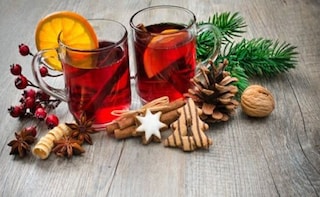I still remember my first visit to Switzerland a few years ago. This wasn't a typical summer sojourn but a trip that was planned smack in the middle of winter and the Christmas Season. The main agenda was to criss-cross some of the country's fabled winter destinations and skiing hubs like St Moritz. Along with all the cross country skiing, the most fascinating part of that visit were the Christmas markets. Some that were very traditional and others that sprung up in busy town squares and even railway stations. It was at one of these markets that I first discovered mulled wine.There are few things that can comfort you like a warm glass of mulled wine on a cold night and it took just one swig for mulled wine to become my chosen nightcap for the rest of that trip. More recently I was in Berlin around Christmas where I was invited to a pre-Christmas dinner and where I rediscovered the pleasures of a soothing cup of home-made mulled wine. It's called Gluhwein in the German speaking parts of Europe. Gluhwein translates into 'glow wine' because this warm beverage is believed to lend your cheeks a pink glow.
It boils down (literally) to your preference. It's the same for the wine that you use. I would recommend that you use a wine that you'd like to drink. It's usually a red wine - a Merlot or Cabarenet Sauvignon, but you could also use a cheaper table wine. It's not entirely uncommon in Germany to use a white wine for your mix. If you're confused about what spices to use (and the proportion), you could order a mulling spice mixture (available on quite a few online portals) for your mulled wine fix. These spices are used in other mulled drinks like an apple cider and you could also experiment with warm fruit juices in the winter.
Mulled Wine (Gluhwein)Serves 8Recipe Courtesy: Teuku Syafrulsyah, Executive Chef, Park Hyatt, ChennaiIngredients:125g castor sugar1 cinnamon stick6 juniper berries, crushed1 pinch freshly grated nutmeg1 orange, studded with cloves then cut into thin slices1 lemon, thinly sliced150ml orange liqueur (Cointreau)750ml red wineMethod:1. Place the sugar in a pan with 450ml of water. Add the cinnamon stick, juniper berries, nutmeg, one orange slice and the lemon slices.2. Heat gently (Do not boil at a high temperature) to dissolve the sugar. Bring to the boil, then turn off the heat and stand for 10 minutes to allow everything to infuse.3. Add the liqueur and red wine and heat through gently, then pour into a jug. Add the remaining orange slices and serve.
It boils down (literally) to your preference. It's the same for the wine that you use. I would recommend that you use a wine that you'd like to drink. It's usually a red wine - a Merlot or Cabarenet Sauvignon, but you could also use a cheaper table wine. It's not entirely uncommon in Germany to use a white wine for your mix. If you're confused about what spices to use (and the proportion), you could order a mulling spice mixture (available on quite a few online portals) for your mulled wine fix. These spices are used in other mulled drinks like an apple cider and you could also experiment with warm fruit juices in the winter.
Advertisement
Mulled Wine (Gluhwein)
Advertisement
Advertisement
Advertisement
For the latest food news, health tips and recipes, like us on Facebook or follow us on Twitter and YouTube.
Advertisement
